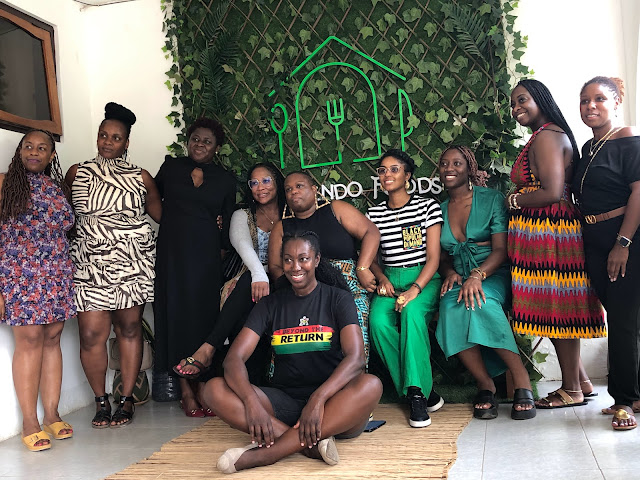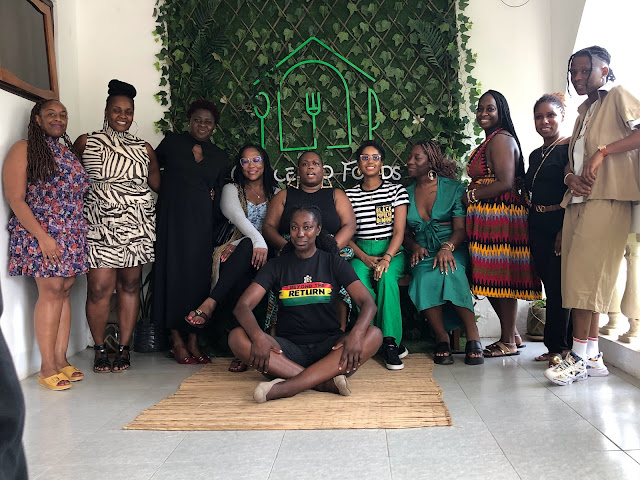 Ghana has become a hot spot for tourists all over the world, especially people of black roots who are looking to get some knowledge about black history from the core source but not through history books.
Ghana has become a hot spot for tourists all over the world, especially people of black roots who are looking to get some knowledge about black history from the core source but not through history books.The year 2023 marks the 50th anniversary of hip-hop, a cultural movement that rose from humble beginnings in New York to fuel a worldwide phenomenon.
Scholars may debate whether its roots precede Aug. 11, 1973, when DJ Kool Herc debuted his "merry-go-round" technique of playing funk breaks back-to-back to a roomful of teenagers in the Bronx. However, there’s little doubt that this event sparked a flowering of activity throughout the borough, inspiring DJs, breakdancers, graffiti artists, and, eventually, pioneering MCs like Coke La Rock and Cowboy.
The music industry eventually caught wind of the scene, leading to formative 1979 singles like the Fatback Band "King Tim III" the funk band featured MC and hypeman Timothy "King Tim III" Washington and the big one: the Sugarhill Gang’s "Rapper’s Delight."
Today, rap music is the most popular genre of music, led by superstars such as Drake, Kendrick Lamar, Future, Eminem, and many others. Despite its massive success, many artists retain their strong ties to communities of color, reflecting the genre’s origins as a form rooted in the streets.
To mark hip-hop’s 50th anniversary, press play on the playlist below, or head to Amazon Music, Apple Music and Pandora for a crash course in this quintessential stateside artform further proof of the genius of Black American music. - source:grammy.com
In light of this, the CEO of Cresendo Foods, located in the heart of the westlands inside Accra-Ghana, which is West Africa’s first food co-working hub, opted to celebrate the 50th anniversary of hip-hop in Ghana at her restaurant as part of the December experience in Ghana. This event took place on December 16, 2023.
The event was patronized by mostly Ghanaians from the diaspora and was in the form of an eat, drink, and performance of rap and dance music. It was a wonderful experience where the old school patrons had to show the new school how they used to do it back in the day by sharing some dance moves and rap bars coupled with reminisces of their youthful times.
Chef Awo, a prominent Ghanaian chef based in the United States, kept the energy going by exhibiting her amazing recipes; she refreshed the patrons with lots of dishes, down to deserts and all. There was no dull moment at Lady P’s crescendo foods as everyone dined and danced to old-school hip-hop from the 70s.
You can contact Cresendo Foods on +233593923603 or on Instagram @crescendo_foods.
Lets look at a brief history of Hip-Hop sourced from www.wikipedia.org
Hip-hop or hip hop, also known as rap, and formerly known as disco rap, is a genre of popular music that originated in the early 1970s by African Americans and Caribbean immigrants in the Bronx, a borough of New York City. Hip-hop music originated as an anti-drug and anti-violence genre consisting of stylized rhythmic music (usually built around drum beats) that often accompanies rapping, a rhythmic delivery of poetic speech. According to the professor Asante of African American studies at Temple University, "hip hop is something that blacks can unequivocally claim as their own". The music developed as part of the broader hip hop culture, a subculture defined by four key stylistic elements: MCing/rapping, DJing/scratching with turntables, break dancing, and graffiti art. While often used to refer solely to rapping and rap music, "hip hop" more properly denotes the practice of the entire subculture. The term hip hop music is sometimes used synonymously with the term rap music, though rapping is not a required component of hip hop music; the genre may also incorporate other elements of the culture, including DJing, turntablism, scratching, beatboxing, and instrumental tracks.
Hip hop as both a musical genre and a culture was formed during the 1970s when block parties became increasingly popular in New York City, particularly among African American youth residing in the Bronx. At block parties, DJs played percussive breaks of popular songs using two turntables and a DJ mixer to be able to play breaks from two copies of the same record, alternating from one to the other and extending the "break". Hip hop's early evolution occurred as sampling technology and drum machines became widely available and affordable.
Turntablist techniques such as scratching and beatmatching developed along with the breaks. Rapping developed as a vocal style in which the artist speaks or chants along rhythmically with an instrumental or synthesized beat.
Hip hop music was not officially recorded for play on radio or television until 1979, largely due to poverty during the genre's birth and lack of acceptance outside ghetto neighborhoods.Old-school hip hop was the first mainstream wave of the genre, marked by its disco influence and party-oriented lyrics. The 1980s marked the diversification of hip hop as the genre developed more complex styles and spread around the world. New-school hip hop was the genre's second wave, marked by its electro sound, and led into golden age hip hop, an innovative period between the mid-1980s and mid-1990s that also developed hip hop's own album era. The gangsta rap subgenre, focused on the violent lifestyles and impoverished conditions of inner-city African American youth, gained popularity at this time. West Coast hip hop was dominated by G-funk in the early-mid 1990s, while East Coast hip hop was dominated by jazz rap, alternative hip hop, and hardcore hip hop. Hip hop continued to diversify at this time with
other regional styles emerging, such as Southern rap and Atlanta hip hop. Hip hop became a best-selling genre in the mid-1990s and the top-selling music genre by 1999.
The popularity of hip hop music continued through the late 1990s to early-2000s "bling era" with hip hop influences increasingly finding their way into other genres of popular music, such as neo soul, nu metal, and R&B. The United States also saw the success of regional styles such as crunk, a Southern genre that emphasized the beats and music more than the lyrics, and alternative hip hop began to secure a place in the mainstream, due in part to the crossover success of its artists. During the late 2000s and early 2010s "blog era", rappers were able to build up a following through online methods of music distribution, such as social media and blogs, and mainstream hip hop took on a more melodic, sensitive direction following the commercial decline of gangsta rap. The trap and mumble rap subgenres have become the most popular form of hip hop during the mid-late 2010s and early 2020s. In 2017, rock music was usurped by hip hop as the most popular genre in the United States. The word hip-hop is coined from the words "hip" and "hop" in combination have a long history. In the 1950s, older
folks referred to teen house parties as "hippity hops". The creation of the term hip hop is often credited to Keef Cowboy, rapper with Grandmaster Flash and the Furious Five. However, Lovebug Starski, Keef Cowboy, and DJ Hollywood used the term when the music was still known as disco rap. It is believed that Cowboy created the term while teasing a friend who had just joined the U.S. Army, by scat singing the words "hip/hop/hip/hop" in a way that mimicked the rhythmic cadence of soldiers marching












































إرسال تعليق